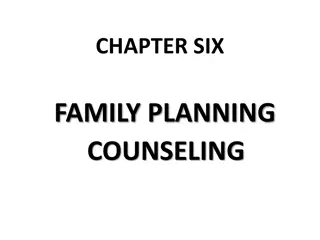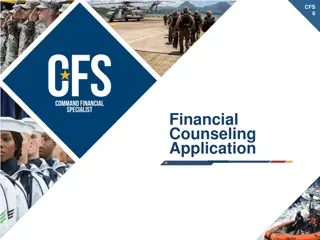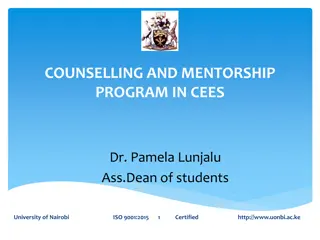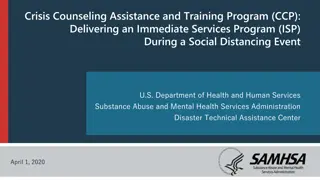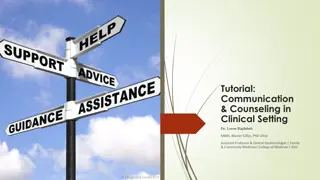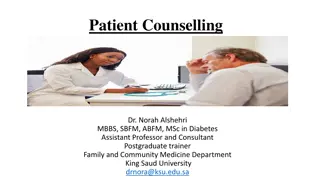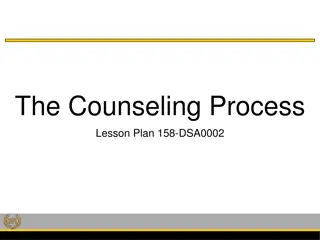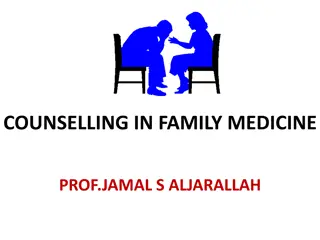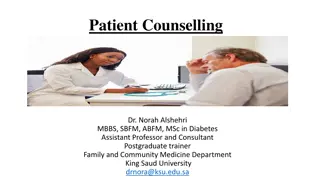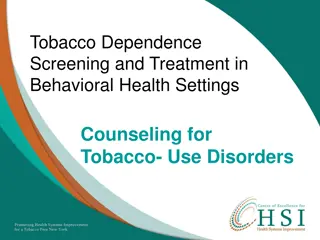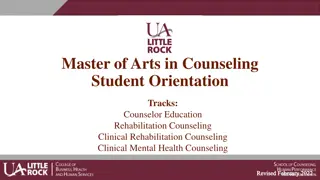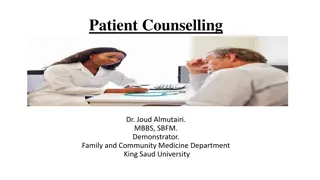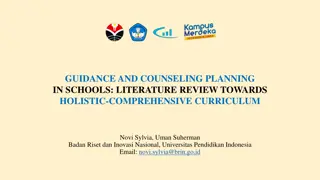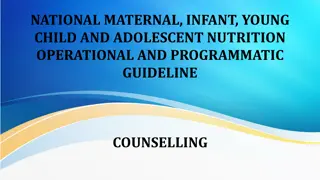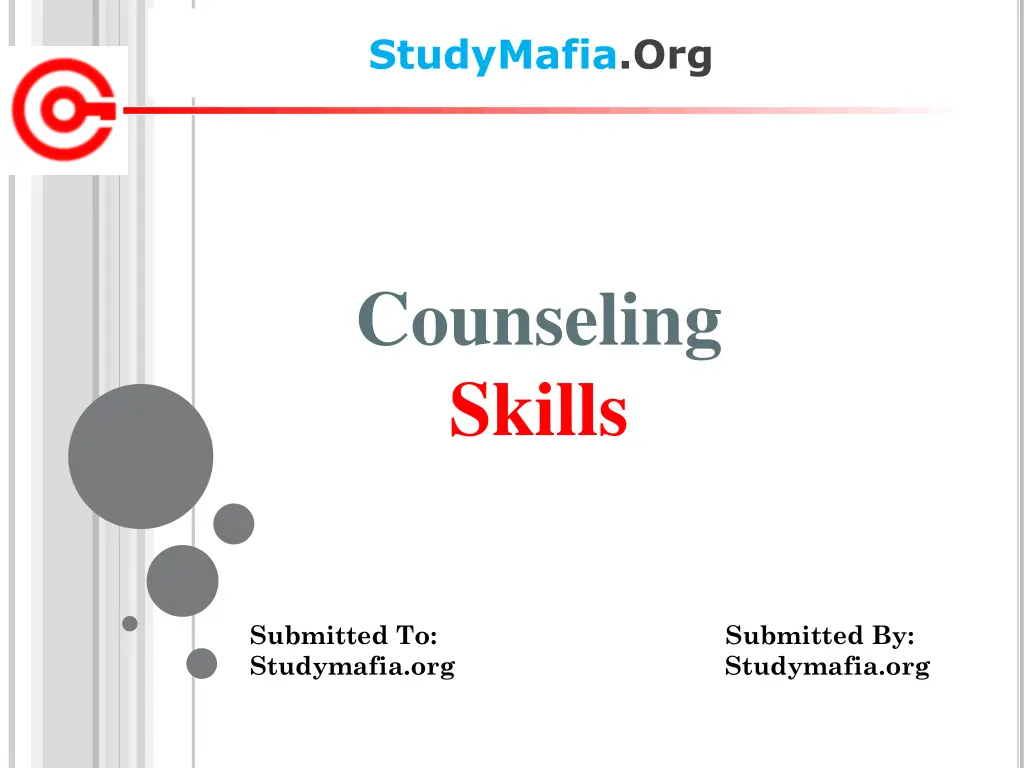
Essential Counseling Skills and Techniques Guide
Discover the definition, importance, and various formats of counseling, along with essential counseling skills and techniques. Learn how counseling can help individuals overcome challenges and explore their thoughts in a safe environment.
Download Presentation

Please find below an Image/Link to download the presentation.
The content on the website is provided AS IS for your information and personal use only. It may not be sold, licensed, or shared on other websites without obtaining consent from the author. If you encounter any issues during the download, it is possible that the publisher has removed the file from their server.
You are allowed to download the files provided on this website for personal or commercial use, subject to the condition that they are used lawfully. All files are the property of their respective owners.
The content on the website is provided AS IS for your information and personal use only. It may not be sold, licensed, or shared on other websites without obtaining consent from the author.
E N D
Presentation Transcript
StudyMafia.Org Counseling Skills Submitted To: Submitted By: Studymafia.org Studymafia.org
Table Contents Definition Introduction Formats of Counseling Process of Counseling Counseling Skills Types of Counseling Conclusion 2
Definition A counselor is a professionally trained expert who helps people overcome their issues after a systematic chain of sessions. The types of counselling vary, depending on the needs of the clients. 3
Introduction Counseling is a talking therapy that allows people to discuss their problems with trained professionals in a peaceful and safe ambiance. The exact meaning of counseling might vary among individuals. But in general, it is the process where you talk about your issues in detail either intending to overcome the same or to explore your thoughts comprehensively. 4
Formats of Counseling In-Person: Face-to-face counselling sessions take place in the counselor s chamber where you meet them in person after scheduling an appointment to discuss your problems. It is one of the most popular counselling formats. 6
Formats of Counseling Group Counselling: Professionals provide group counselling sessions where you can join to address the issues. Joining such a group will help you find people with similar problems and you will be able to develop a strong network of support as well. However, if you wish to focus on your problem, in-person sessions are better. 7
Formats of Counseling Telephonic Sessions: A great alternative to in- person counselling sessions are telephonic rounds that can be scheduled from the comfort of your home. Telephonic counselling rounds are best for busy individuals who might find it difficult to get into the chambers. 8
Formats of Counseling Online Counselling: If you wish not to meet your counselor face to face and protect your anonymity, you have the option to email the counselor. In this process, you have the scope to think well and decide which of the problems you want to discuss with him. The online counselling trend is becoming much more popular these days. 9
Process of Counseling Building a Warm Relationship When you are hitting up a counselor to discuss your problems, you ought to suffer from any serious issue concerning academics, relationships, career, or anything else. The first thing your expert does is to make yourself comfortable around him/her. 10
Process of Counseling Analysis Now comes the second part, which is assessment. In this stage, the professional encourages you to speak in detail about your problems to grab the roots of the problem. He observes every minute detail from how you are speaking to your reactions to certain questions that might come from his end. 11
Process of Counseling Setting the Goal After a thorough evaluation of your problems, now comes the significant section of goal setting. Considering the issues you are facing the counselor sets a goal. That can be either you overcoming the problem or reconciling with it. 12
Process of Counseling Plan of Action The counselor plans an action for you to practice to see the results. Suppose someone has public speaking fear, The expert might ask him to practice speaking in front of the mirror. This is just an instance. Once you go through the plan for the desired tenure, he assesses your improvement. 13
Process of Counseling Overcoming the Problem As I mentioned in the previous point after you follow the plan of action the consequent results are taken into consideration. If things seem to go in the right direction and you start feeling relaxed, yes! You have achieved your goal. 14
Counselling Skills Effective Listening: A counselor must be a patient listener who not only listens to the clients queries but can handle them intricately. Without hearing the issues minutely, it is impossible to get ahead with the next counselling steps. Therefore, the counselor has to be someone with good listening skills who gives full attention to the client and their details. 15
Counselling Skills A Good Communicator: A counselor is someone who listens to his clients, analyses the problems, and develops a plan of action to achieve a target. It is indeed critical to be a very good communicator to help the person feel comfortable around him and make sure the client is not hesitating while speaking in front of him about his problems. 16
Counselling Skills Analysis: A successful counselor is someone who is not only a good listener but a good analyzer too, who uses his skills and expertise to reach the root of the problem and analyze it. Without analysis, the entire process is in vain as no goals can be set and the client will not be able to undergo any plan of action. 17
Types of Counseling Mental Health Counselling A mental health counselor is responsible for providing the people with support who are going through any emotional distress like fear of something, anxiety, depression, or frustration. There are different causes when people need mental health counselling that may include, extensive grief, supreme anger issues, addiction to something, family issues, eating disorders, and so on 18
Types of Counseling Career Counselling A little different from the traditional counselling processes, career counselling means providing aspirants with career guidance and showing them the right path towards a bright career according to their areas of interest and skills. 19
Types of Counseling Rehabilitation Counselling The rehabilitation counselling process helps people with disabilities fulfill their goals and lead an independent life with complete participation in the community. This is a systematic method to help people with emotional, physical, cognitive, and mental disabilities. 20
Types of Counseling Relationship Counselling Also known as couples therapy, people seek such counselling when something serious affects their love life. People choose to go for relationship counselling for various reasons including the desire to have a stronger relationship with the partner or spouse, issues emerging from disagreement, unhealthy abuses, something hectic that affected their lives, etc. 21
Conclusion Counselling is a form of 'talk therapy'. It is a process where an individual, couple or family meet with a trained professional counsellor to talk about issues and problems that they are facing in their lives. Professional counselling is confidential and non-judgmental. 23
REFERENCES Google.com Wikipedia.org Studymafia.org Slidespanda.com
THANKS TO STUDYMAFIA.ORG

